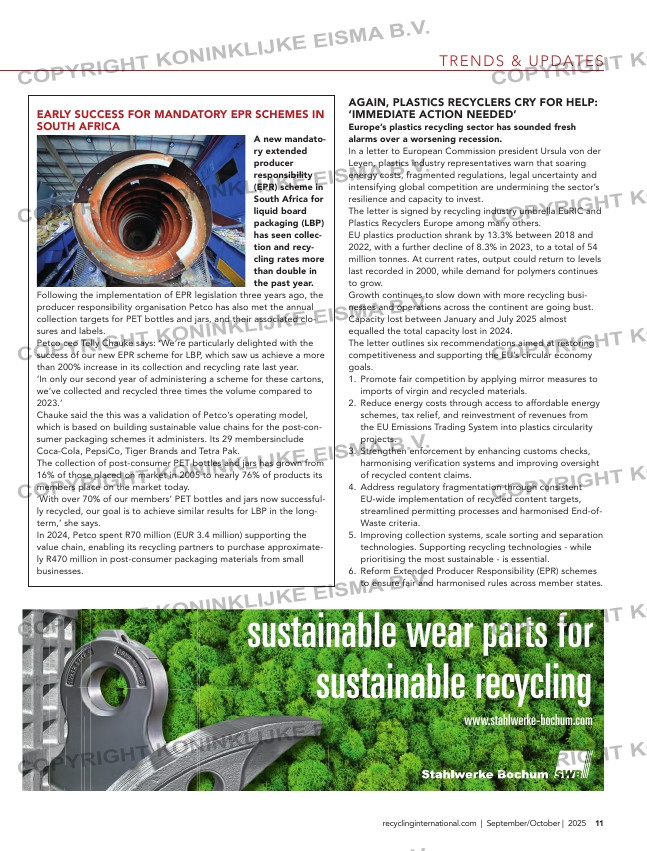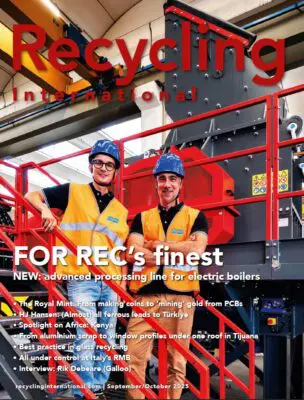Page 11 from: Recycling International September/October 2025

TRENDS & UPDATES
11recyclinginternational.com | September/October | 2025
Fotobijschrift
AGAIN, PLASTICS RECYCLERS CRY FOR HELP:
‘IMMEDIATE ACTION NEEDED’
Europe’s plastics recycling sector has sounded fresh
alarms over a worsening recession.
In a letter to European Commission president Ursula von der
Leyen, plastics industry representatives warn that soaring
energy costs, fragmented regulations, legal uncertainty and
intensifying global competition are undermining the sector’s
resilience and capacity to invest.
The letter is signed by recycling industry umbrella EuRIC and
Plastics Recyclers Europe among many others.
EU plastics production shrank by 13.3% between 2018 and
2022, with a further decline of 8.3% in 2023, to a total of 54
million tonnes. At current rates, output could return to levels
last recorded in 2000, while demand for polymers continues
to grow.
Growth continues to slow down with more recycling busi-
nesses and operations across the continent are going bust.
Capacity lost between January and July 2025 almost
equalled the total capacity lost in 2024.
The letter outlines six recommendations aimed at restoring
competitiveness and supporting the EU’s circular economy
goals.
1. Promote fair competition by applying mirror measures to
imports of virgin and recycled materials.
2. Reduce energy costs through access to affordable energy
schemes, tax relief, and reinvestment of revenues from
the EU Emissions Trading System into plastics circularity
projects.
3. Strengthen enforcement by enhancing customs checks,
harmonising verification systems and improving oversight
of recycled content claims.
4. Address regulatory fragmentation through consistent
EU-wide implementation of recycled content targets,
streamlined permitting processes and harmonised End-of-
Waste criteria.
5. Improving collection systems, scale sorting and separation
technologies. Supporting recycling technologies – while
prioritising the most sustainable – is essential.
6. Reform Extended Producer Responsibility (EPR) schemes
to ensure fair and harmonised rules across member states.
EARLY SUCCESS FOR MANDATORY EPR SCHEMES IN
SOUTH AFRICA
A new mandato-
ry extended
producer
responsibility
(EPR) scheme in
South Africa for
liquid board
packaging (LBP)
has seen collec-
tion and recy-
cling rates more
than double in
the past year.
Following the implementation of EPR legislation three years ago, the
producer responsibility organisation Petco has also met the annual
collection targets for PET bottles and jars, and their associated clo-
sures and labels.
Petco ceo Telly Chauke says: ‘We’re particularly delighted with the
success of our new EPR scheme for LBP, which saw us achieve a more
than 200% increase in its collection and recycling rate last year.
‘In only our second year of administering a scheme for these cartons,
we’ve collected and recycled three times the volume compared to
2023.’
Chauke said the this was a validation of Petco’s operating model,
which is based on building sustainable value chains for the post-con-
sumer packaging schemes it administers. Its 29 membersinclude
Coca-Cola, PepsiCo, Tiger Brands and Tetra Pak.
The collection of post-consumer PET bottles and jars has grown from
16% of those placed on market in 2005 to nearly 76% of products its
members place on the market today.
‘With over 70% of our members’ PET bottles and jars now successful-
ly recycled, our goal is to achieve similar results for LBP in the long-
term,’ she says.
In 2024, Petco spent R70 million (EUR 3.4 million) supporting the
value chain, enabling its recycling partners to purchase approximate-
ly R470 million in post-consumer packaging materials from small
businesses.
INDIA PUMPS EUR 1.5 BILLION TO DOMESTIC RECYCLING
SECTOR
The Indian government
has approved financial
support of 1 500 crore
IND (EUR 1.5 billion) to
ramp up the country’s
battery and electronics
recycling capacity and
boost the recovery of crit-
ical metals. The incentive
scheme is an explicit invi-
tation to start-up busi-
nesses.
The incentive programme is part of India’s National Critical Mineral Mission,
aimed at building the domestic capacity of critical minerals and resilience in the
supply chain. It will be rolled out from 2026 to 2031 across the broad electron-
ics recycling sector, especially for companies active in the processing of
e-scrap, lithium-ion batteries and catalytic convertors from end-of-life vehicles.
The incentive is meant for established as well as smaller recyclers. It includes
start-ups, for which one-third of the funding has been earmarked. The scheme
will be applicable to investments in new units as well as expansion of capacity,
and the modernisation and diversification of existing units.
The scheme will provide incentives only for the recycling value chain in the
‘actual extraction of critical metals’ and not the value chain involved in only
black mass production.
The government expects the programme to create 70 000 new jobs.
CANADIAN BATTERY RECYCLER SETS UP DEMO PLANT
AND LAB
Canadian lithium bat-
tery recycler
RecycLiCo Battery
Materials has acquired
a facility in Delta,
British Columbia,
which will serve as the
company’s new corpo-
rate headquarters and
operational hub.
The building will house
executive offices, recy-
cling demonstration
plant, and a fully
equipped in-house ana-
lytical laboratory. With
high-power infrastruc-
ture and strong transport access, the facility is expected to expand the
company’s capabilities, strengthen quality control and boost development
of its hydrometallurgical technology for recycling batteries.
‘This acquisition is a significant step forward becoming a commercial par-
ticipant in the domestic supply chains for lithium, cobalt, nickel, manganese
and other critical minerals,’ says interim ceo Richard Sadowsky.
He adds that the new facility will enhance RecycLiCo’s ability to pursue
government funding opportunities.
sustainable wear parts for
sustainable recycling
www.stahlwerke-bochum.com
10-11-12-13-14-15_trendsupdates.indd 11 09-09-2025 09:03



